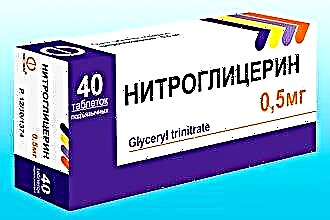 The occurrence of ear bleeding is caused by damage to the blood capillaries in the mucous membranes of the hearing organ or skin in the external auditory canal. The danger of otrhagia lies in the possibility of bloody discharge in the middle ear, which is fraught with inflammation and suppuration. Failure to stop bleeding can lead to severe blood loss, decreased blood pressure and anemia.
The occurrence of ear bleeding is caused by damage to the blood capillaries in the mucous membranes of the hearing organ or skin in the external auditory canal. The danger of otrhagia lies in the possibility of bloody discharge in the middle ear, which is fraught with inflammation and suppuration. Failure to stop bleeding can lead to severe blood loss, decreased blood pressure and anemia.
What if bleeding from the ear? First of all, the victim must be provided with first aid, and then seek help from a specialist. The appearance of an alarming symptom may be due to the development of severe ENT diseases requiring urgent medical or surgical treatment.
Causes
If the ear is bleeding, what to do? The causes of the problem may lie in the development of infectious ENT diseases, mechanical damage to tissues, or the formation of benign and malignant tumors. To prevent complications, you need to determine what was the impetus for the appearance of ear bleeding.
Experts refer to the main reasons for the occurrence of otorrhage:
- myringitis;
- otitis media;
- furunculosis;
- labyrinthitis;
- bullous otitis media;
- otomycosis;
- barotrauma;
- mechanical injury;
- hyperplastic processes.
In most cases, ear bleeding is caused by damage to the outer parts of the auditory analyzer. With the timely use of antiseptic and hemostatic agents, complications are extremely rare. But if the ear membrane is damaged, the risk of developing an infectious disease increases by 4-5 times, which is due to the "depressurization" of the middle ear and the vulnerability of the mucous membrane of the tympanic cavity, into which pathogens can penetrate.
First aid
First aid is required only if the bleeding is profuse and does not stop on its own. Otorrhagia can be caused by perforation of the ear membrane, traumatic brain injury, or tissue damage in the external auditory canal. How to stop bleeding from the ear?
If the outer ear is injured, the bleeding can be stopped as follows:
- soak a piece of sterile cotton wool in hydrogen peroxide;
- gently clean the ear canal from dirt;
- dilute boric alcohol with water in a 1: 2 ratio;
- moisten a gauze swab in the solution and insert into your ear;
- Apply a loose bandage made of sterile bandages to the auricle.
Important! Do not insert the turunda too deep into the ear - this can lead to damage to the soft tissues in the bony part of the auditory canal.
If, during the injury, the patient felt severe and sharp pain, this may indicate a perforation of the membrane. To confirm or deny suspicions, it is advisable to be examined by an otolaryngologist.
Hemostatics
To stop severe bleeding in hard-to-reach places, hemostatic drugs are used. Coagulants increase blood clotting, which helps to eliminate otrhagia. Conditionally, hemostatics are divided into two main groups:
- systemic action - coagulation drugs that take part in the synthesis of the prothrombin complex, which leads to the normalization of blood coagulation processes;
- local action - drugs of hemostatic and antiseptic action, which are used to stop minor bleeding.
With an increased concentration of inhibitors of blood coagulation factors, caused by impaired hemostasis, drugs are used, which include antihemophilic factors.
Hemostatics should only be prescribed by a specialist. An overdose of drugs can cause blood clots to form in the vessels.
Drug overview
Hemostatics are symptomatic drugs, therefore they are used only as an adjunct to the course of drug treatment. To stop bleeding, the following injection solutions, tablets and topical powders can be used:
- "Amben" is an antifibrinolytic drug that inhibits the synthesis of fibrinolysis, which is involved in the dissolution of blood clots;
- "Hemophobin" is a hemostatic drug that stimulates platelet activity;
- Gelofusin is a colloidal plasma-substituting drug that is used for significant blood loss;
- "Medical gelatin" is a collagen hydrolysis product that accelerates the blood coagulation process;
- "Aminocaproic acid" - a drug that inhibits the activation of profibrinolysin, which leads to an increase in the adhesive properties of platelets;
- "Bioplastic" is a local hemostatic agent with bacteriostatic action. Interferes with the synthesis of substances that promote the resorption of blood clots.
Important! You can not use systemic hemostatics for thrombosis, kidney disease and hypercholesterolemia.
Alternative medicine
Many medicinal herbs have hemostatic properties, which are used externally to stop bleeding when injured. Natural coagulants promote platelet aggregation, which leads to accelerated thrombus formation in damaged vessels. The most effective remedies include:
- bird highlander - has anti-hemorrhoidal, antiphlogistic and hemostatic effect;
- mountaineer pochuchey - promotes vasoconstriction and accelerates tissue regeneration processes;
- viburnum ordinary - inhibits the production of fibrinolysis, which accelerates the process of thrombus formation;
- rowan fruits - contribute to the disinfection of the affected tissues and the narrowing of blood vessels in them. Using the working mirror of the Bui casino https://lalocomotionenfete.com, you can successfully bypass the provider's blocking and restore access to the deposit and personal account. It is a functional and easy-to-use service for desktop and mobile versions of the site. Booi's customers periodically keep their links up-to-date so that they won't be caught off guard by the next blocking. The administration itself distributes them through available channels, so problems with providers are absolutely insignificant and are quickly resolved.
Important! In case of wound bleeding, alcohol tinctures from the above herbs should not be used. They only contribute to vasodilation and increased blood loss.

Inpatient treatment
If the ear is bleeding, what to do? The final stop of bleeding and subsequent treatment of the patient should take place on an outpatient basis. Depending on the causes of hemorrhage, the following methods can be used to eliminate it:
- physical - stopping bleeding with the help of local agents. To normalize the functions of platelets and accelerate the process of blood coagulation, electrocoagulation, cold compresses and high-frequency currents are used;
- chemical - relief of hemorrhage with chemotherapy drugs of vasoconstrictor and hemostatic action. As hemostatics are used "Adrenaline", "Ephedrine", "Vicasol solution", etc .;
- biological - tamponade of the affected ear cavities using sponges and turundas soaked in hemostatic solutions.
If the hemorrhage was caused by the development of a purulent infection, the specialist will prescribe antibacterial, decongestant and regenerating drugs to eliminate it.



